A Guide to Wasting Time!
Back to Index
A Guide to Wasting Time
Section 1: Gaming: A Retrospective
I consider myself to be a witness to the development of computer gaming. With the exception of a few notable early games such as Pong, I have lived to see computer games grow from their humble monochromatic beginnings to the immersive, intense experiences they've become today. For much of my life I was consistently aware of which games were the best available, and I tried just about all of the good ones. I've even programmed several of my own and on various platforms through the years. For the past five or ten years gaming has taken a drastically reduced role in my life. I no longer allow myself the swathes of time to burn in obtaining that next level, or to explore the dungeon behind that waterfall. Nonetheless, I have maintained an appreciation for the creativity and imagination that is contained in some of the best games, and once in a while I will go back and wax nostalgic by experiencing them in brief once again. As I very rarely approach the current releases these days, I feel that my 'looking back' approach has given me some insight into which games have left the greatest impression on me and which provide the most enjoyment when revisited. Of course my feelings are going to be very biased, as preference in gaming is entirely subjective, especially when the games are wrapped up in nostalgia. In addition, ever since the release of the Playstation 2, I have found myself to prefer computer games much more than console games, although there are some standout console games I've enjoyed of late. So, without further ado, here's my list of my twenty favorite games as well as a list of ten unique games that I spent tons of time playing...
Section 2: The 30 Greatest Games
I'm not directly ordering them, per se, but I've chosen to put the most influential and remarkable games towards the top. This does not imply that any direct comparison between games is even possible...
| Title | Platform/Developer/Date | Genre | Notes |
|---|
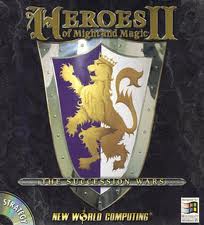
Heroes of Might and Magic II | PC
New World Computing
1996 | Turn-Based
Strategy | I've spent more time playing this game than any other. It's fanciful, colorful, fun, and built upon the most perfectly balanced strategy engine and rules of any game out there. It runs on anything, including my netbook, flawlessly. There's even a version you can get for an iPhone/iPad, although it requires unlocking (last I checked). For those of you who are familiar with this series, I feel that this game represents the pinnacle, although I have enjoyed III, IV, and V immensely. I feel that the added units and skills in III complicates the strategy too much, and that in IV, beefing up the fighting capacity of the hero (who can now join the battle) makes the game too easy and unbalanced. Heroes V is thus far a great game, and proves that this genre can survive the transition to 3D. |
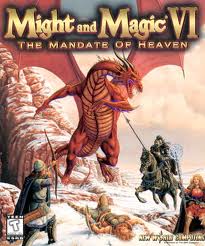
Might and Magic VI:
The Mandate of Heaven | PC
New World Computing
1998 | Role-Playing | When I was in middle school, I was more hooked to this game than I have been to any game before or since. It was so bad that it almost ruined family camping trips. Having gone back on a couple of occassions to replay the game all of the way through, I can confirm that this obsession wasn't unfounded, and that this game deserves far more recognition than it gets. There are tons of things to love about this game. The story, the quirkiness, the fact that you control an entire party instead of a single character, the skills and spells and difficulty. It all fits together so well that I wasn't even upset when I discovered the perhaps unintended over-power of the 'Shrapmetal' spell and abused it nonstop. Certain areas of the game spell instant death for even the most advanced party, and nothing stops a novice from accidentally wandering into such places. The sheer number of quests is staggering, and despite the open-ended nature of the game, the storyline maintains a cohesiveness from beginning to end. The next few games in this series, all based upon the same engine, were not nearly as enjoyable, although a couple of them are still worth trying if you enjoy this one. |
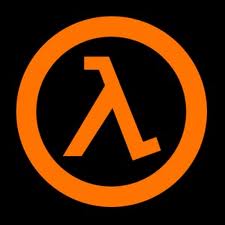
Half-Life 1, 2 and Counterstrike | PC
Valve
1998, 2004 | First-Person Shooter | Very few other modern game series have as much popularity and critical consensus as Half Life. It's practically the Radiohead of video games. The environments are incredibly detailed for a shooter, and it was the first such game to immerse the player to the level of a role-playing game. As a scientist-turned-incident-survivor in the first Half-Life, the player is tasked with escaping from the Black Mesa compound. During this enterprise, a series of deus-ex events, such as government cover-ups and alien invasions occur, leading the player into increasingly dangerous and unfamiliar territory. The final battle, with a several-story tall floating fetus, is quite memorable. The second game, released six years later, reflects the incredible leaps in the gaming experience that had occurred. Even more visually appealing and immersive than the original, Half Life 2 is still considered by many to be the greatest PC game ever created. The opening sequence itself, in which the player must re-discover his own identity, is one of the greatest achievements in storytelling that I've ever seen in a game. In addition to these two single-player titles, Half Life also spawned Counterstrike, which was a multi-player 'deathmatch' type game modelled on the Half Life engine. For several years, this game was the online multiplayer PC game. I actually played it quite heavily during this time, and even joined an online 'clan'. We hosted a few servers that specialized in quirky maps (such as rats levels where all the players were the size of mice, and the levels were big rooms in a house). I thoroughly enjoyed playing counterstrike for a few years and found it incredibly skillful and addictive. Eventually, in college, I realized through some organized matches how inferior I actually was to the true nerdgeeks out there and decided to put it down. |

Civilization II, IV and V
[and Colonization] | PC
Sid Meier, Firaxis
1996, 2005, 2010
[and 1994] | Turn-Based Strategy | Civilization II represented a huge change in my gaming world-view. Up to that point, I conceived of games as relatively simple, having contrived environments, rules-driven, and totally unrelated to the real world. Even other strategy games such as Heroes II are very limited in scope. With Civilization, however, you take a single settler in 4000 B.C., create a civilization, and take it through the epochs of history and into the space age. You are responsible not only for city planning and resource management, but also the invention of technologies and the foreign relations with all of the other civilizations. Along the way you can build world wonders, exactly the same as those that exist in the real world, and each of these confers a unique benefit to your civilization. The progressive nature of this game, as well as the fact that it incorporates elements of technology, religion, planning, military and business, make it incredibly complex, and yet an intelligent player can learn to make use of each of these characteristics in a beneficial way. The series has become strengthened with the addition of the two latest installments, IV, and V, and I recommend that newcomers start with the latest and don't worry about going back. They've been very loyal to the mechanics of the game and the changes version to version have largely improved the experience. This has also held true for the recent remake of Colonization, an early Civ spinoff that I played at least as much as Civilization 2 when I was younger. Colonization focuses on the discovery and settlement of America, and although it is a simpler game, it piqued my interest in colonial America. I can honestly say that I learned something from that game. Long live Civilization! |
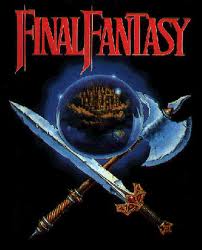
Final Fantasy I, III, VII, Tactics | Nintendo, SNES & Playstation
Square
1990, 1994, 1997, 1998 | Role-Playing & Turn-Based Strategy (Tactics) | My original 'Favorite Game' was Final Fantasy. I'm not sure what drew me to it originally, I was only eight or nine when it came out, but I remember I got my parents to immediately buy me a copy, despite it costing like $50 in 1990. I never beat the game on the original Nintendo console. I'd seen a friend down the street do it, but for a long time I'd never successfully defeated Chaos, the end guy. I'd come close on several occassions, but it wasn't until much more recently, with the help of an emulator, that I made quick work of the game. I still feel that the first Final Fantasy sets the bar for all role-playing games, and I still appreciate its difficulty and breadth of scope. It was the game that introduced the concept of 'fighting off' to gain experience, and required full investment to complete. When I was a child, my first self-authored piece of writing longer than a few pages was a story that paralleled the story in this game :-) Later installments of Final Fantasy have been, in my opinion, somewhat hit or miss, but generally very high quality. Final Fantasy III for SNES was great, but it wasn't until VII was released on the Playstation that the bar was raised to an entirely new level. Although FFVII is not nearly as hard as the original, it's almost ridiculous how immersive and grand in scope it was for its time. No other game of that era could hold a candle to FFVII, and pretty much everything about the game (besides the general difficulty) was perfect. The final battle with Sephiroth is one of the most memorable moments in video game history, as are the awe-inspiring towns and scenescapes throughout the game. The game also provides a jaw-dropping number of side-quests and areas to explore, each as detailed as the mainline areas. I could go on and on about this game, but it would be better if you just played it. The other major standout in the series is Final Fantasy Tactics, which has aptly been described as being the game that Shakespeare would have written. It's a super-classic, which is surprising considering it's a departure from the tried-and-true Role-Playing style of the main FF games. I also found tactics to be very challenging, so in this way it satisfied my craving for a quality Square game that I could grind on. |
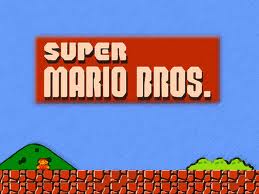
Mario I, II, III, World, World II, 64, Galaxy II | Nintendo, SNES, N64, Wii
1985, 1988, 1989, 1990, 1992, 1996, 2010 | Mario-clone | Who isn't familiar with Mario? The franchise single-handedly established Nintendo as the foremost competitor in the console market. Those of us who enjoy video games have lots to thank the little guy for, as gaming would surely be much different if he never entered the scene. The early mario games are wrapped in nostalgia for me. I can still remember one christmas in the early 1990's when I saw Super Mario World on the SNES for the very first time. It was like a world-shift for me. The graphics and sound were mindblowing. Although I still do not feel like the games themselves are that deep, the sheer quality of the experience, for what it is, is unmatched by rival games of similar character. I never played the mario for N64 when it came out, but when I lived in Madison I got an emulator so that I could play it. Surprisingly, despite its relative age by that point, I was totally blown away by the game and still consider it to be the greatest achievement in the mario series. The programmer's ability to translate what most could only imagine as a 2D game into 3D with such success represented a huge leap forward for all game designers. In 2010 I got a copy of Super Mario Galaxy 2 for Wii for my sister at Christmas. We completed the game in a relatively short amount of time, and thoroughly enjoyed it. The game still isn't terribly deep, but it's pure fun and many goofy and clever ideas are woven into it. Keep it goin' Mario! |
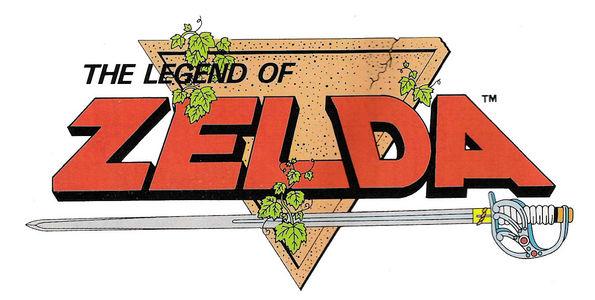
The Legend of Zelda
I, II, Link to the Past, ???? | Nintendo, SNES, ????
1986, 1987, 1991, ???? | Adventure | I can't mention Mario without mentioning Zelda. These two go hand-in-hand more so than any other duo in the annals of gaming. Who can forget the original's gold-cartridge? Or bombing every single wall and attempting to light every single tree on fire to find secret rooms? The game captured the attention of gamers to an almost absurd degree. It was also damn-hard. In fact, it was the only video game that my dad played pretty consistently. After Zelda he wouldn't pick up a video game in earnest again. The Zelda series has aged very well, with each installment consistently garnering top praise from gaming publications. I have actually had very few experiences with any of the Zelda's past the SNES's A Link to the Past. That said, I feel it's my duty to play at least Ocarina of Time (considering many feel it's the best video game ever) and my sister and I have Twilight Princess on the Wii. That's why I left some ? marks to the left. I have confidence that these titles will deserve a place on this entry. |

Castlevania: Simon's Quest and Symphony of the Night | Nintendo, Playstation
1987, 1997 | Action/Adventure | These two titles are unquestionably the standouts in the Castlevania series. So much so that I've neglected to add any others here. To be fair, I haven't played all bajillion of them, but the fact is that it's a series of relative disappointments, and I feel pretty secure in my opinion. Simon's Quest is remarkable for it's length, difficulty and music, which has become iconic in the gaming world. The game spared the player nothing, and beating it unassisted was an incredible accomplishment. Even when I return to it, I find some of the 8-bit imagery to be somewhat haunting. While Simon's Quest is the standout early Castlevania game, it doesn't even compare to Symphony of the Night, which is certainly one of the best games ever released on any platform. Once again, there is incredible music, this time in CD-quality. The size, storyline, and sheer quantity of items and enemies make this title a pleasure to explore. Most people don't stop when its done, but instead continue to play until they have the entirety of the map explored. The one complaint that is often made against the game is that it is too easy, but this is rather simply remedied by restricting yourself in various ways. For example, try to beat the game without using any swords, or how about not using any armor at all? Quite a bit harder, isn't it? I know that this sounds silly, but with a game so good, folks will do such things just to continue playing. |
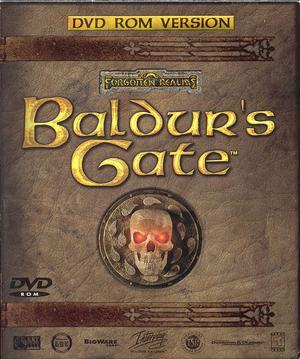
Baldur's Gate I & II | PC
Bioware
1998, 2000 | Role-Playing | The Baldur's Gate Saga, which I have not as yet completed, is a testament to the fact that video games can be artistic. The creators of this game spent countless hours fleshing out the storyline, creating believable-yet-quirky non-player characters and dialogue, and providing the player myriad opportunities to define him/herself through the course of the game. Like Might and Magic VI, you control a party of characters that you can assemble, but instead of doing so from the first-person, this game takes a bird's eye perspective, like Diablo below. The scope of the game is immense, and every part of the game-world is meticulously crafted, with very little left to randomness and probability. I feel like Baldur's Gate is kind of an extension of the early forgotten realms 'Gold Box' games from the late 1980's, and I look forward to finally completing the series (which I'm slowly working on now). |
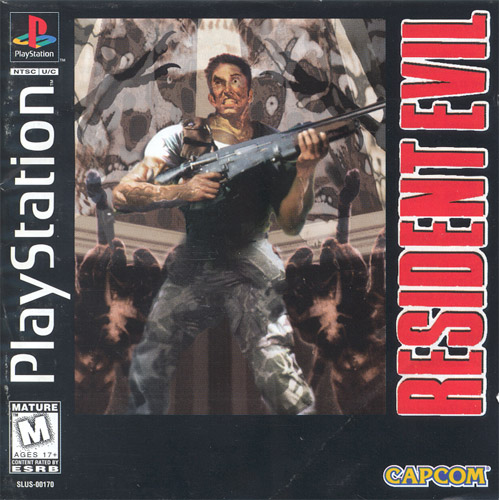
Resident Evil I, II and IV | Playstation, Wii
Capcom
1996, 1998, 2005 | Horror/Puzzle | My exposure to Resident Evil began with the release of the original game on the Playstation when I was in middle school. I remember playing it at my friend's house and being terrified of it. The original game is remarkable for its difficulty, often requiring the player to go for hours without spare ammunition or healing herbs. As a result, any encounter with an enemy can be lethal, so the player remains on edge for long, suspenseful stretches of time. This tradition persisted in later titles, although to a lesser degree. Nonetheless, numbers 2 and 4 retained a great deal of the nature of the original, and both are incredibly well designed and high quality games. Resident Evil IV deserves special mention, I feel, since it's a game I played so recently with my sister on the Wii. When we started playing the game I expected it to be much lower quality than the originals, and I was pretty unfamiliar with the Wii as a gaming system. This title singlehandedly restored my faith in console game designers. The length and depth of the game, as well as the creativity involved in solving many of the game's puzzles and boss encounters left me dumbfounded. Katie and I would often play for an hour or two and then need to save and turn the game off because of how intense it was. Overall, it provided a gaming experience unlike any I've had in a long time. |
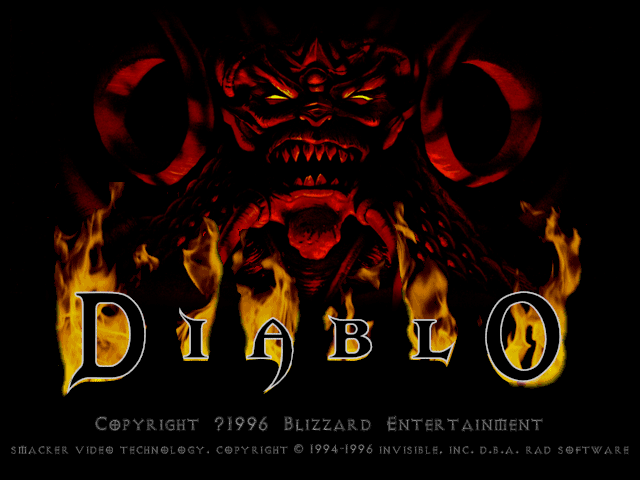
Diablo I & II | PC
Blizzard
1996, 2000 | 3rd Person
Hack n' Slash | The Diablo games could have been forgettable. The mechanics, although novel, are not extraordinary. The gameplay, although novel, is incredibly linear and repetitive. There aren't many characters, and most of them are foils. What makes the game undeniable is in the accoutrements. The music, environment, voice-acting and even the font will give this series everlasting acclaim. The feeling that you get when you finally approach the lord of darkness or lazarus in the original. The amazement when you arrive in the desert-land in the sequel, or when you first behold Azreal. These things stick with gamers, and have made the wait for the third Diablo (expected in late 2011) almost unbearable for some. I find it curious how much time some people are willing to spend developing their Diablo characters online. For me, it's all about the single-player, and I will try my hardest to limit run-throughs of the game to two. Sure, I can play as every type of character and try to unlock all the skills, or find countless unique items, but, in my opinion, it's really not worth the time commitment for something that is ultimately imaginary. |
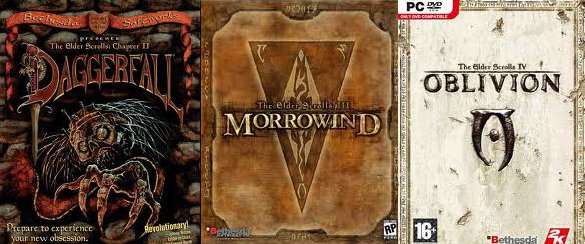
The Elder Scrolls Series:
Daggerfall, Morrowind, Oblivion | PC
Bethesda
1996, 2002, 2006 | First-Person Role-Playing | I've played these three Elder Scrolls titles copiously and immediately upon release. Although the series has a decent following now, back in the days of Daggerfall there were fewer enthusiasts. These have always been considered games for hardcore role-playing fans, due to their scope and open-endedness. In fact, it could easily be argued that these titles contain the largest game-worlds of all. Daggerfall, for example, took days of real-life time to traverse. Unfortunately, this was originally achieved by the generation of random environments and towns. In Morrowind this method was abandoned and all of the landscapes and cities were created by hand, an impressive feat that continued in Oblivion. Another unique innovation in the series is the character's skill development, which progresses according to the player's use of the skills instead of via experience points gained from combat. I have always liked this system, and it has improved with each installment. Another strength of each title is the storyline, which is as circumspect as that of Baldur's Gate. The only downsides have been the bugs. Each of the titles has had its share, although they are certainly getting better. Lastly, I will mention that in each of the games the non-mainline quests and dungeons can start to feel repetitive, and it's pretty easy to start feeling lost and purposeless in such large game-worlds. I think in the next Elder Scrolls the designers should focus on ensuring that the player never feels like their actions have no significance, and to ensure that the late-game non-mainline quests continue to provide surprises. In summary, I have greatly enjoyed these titles, but I think that the best is yet to come from Bethesda. The newest installment, Skyrim, is slated for late 2011, and it may bring me back from the gamer-dead, if only for a little while. |
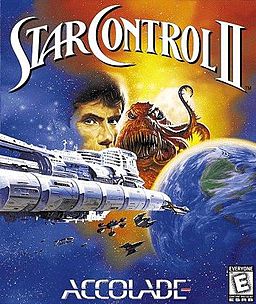
Star Control II | PC
Accolade
1992 | Space Exploration | Star Control II is one of the lesser known games on this list, but it deserves to be highlighted as one of the greatest accomplishments here. Another game that proves to be almost as much art as entertainment, Star Control creates a universe of its own that will occupy your mind from the moment you begin until its finished. The various alien races are each so colorful and memorable that even without the stellar gameplay the game would have staying power. The plot centers around the arrival of two warring races, the Ur-Quan and Kohr-Ah, both of whom are ultimately bent on the annihilation of all other life in the universe. By gaining the respect and assistance from the other races, the player is able to combat this invasive menace and restore relative peace. The entire story occurs on a timeline which imparts a cosmic urgency to the game that I haven't found anywhere else. If you complete the game successfully, you will truly feel as if you have done something incredible. Don't miss this one. |
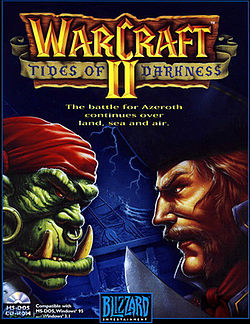
Warcraft II: Tides of Darkness
[ok... and Starcraft] | PC
Blizzard
1995, 1998 | Real-Time Strategy | I have very fond memories of playing Warcraft II. I delighted at the absurd storyline and amusing unit quips. The music was triumphant and the gameplay incredibly smooth. It was challenging and attention-grabbing. It was repetitive, but not overly-so. It was the first standout game of its genre, a genre which would spawn many other important series. In short, I was an early fan of this, my first Blizzard game. When Starcraft came around, I was underwhelmed. Although most of my friends found it to be an incredible game (and apparently worth spending endless hours playing online), I didn't feel it was much of a step forward from Warcraft. Nonetheless I completed it and found the single-player to be an enjoyable experience. I have played the multiplayer a bit, but disliked the repetitive nature of it. Swuboo! |

Twisted Metal 2 | Playstation
SingleTrac
1996 | Vehicular Mayhem | Twisted Metal 2 is perhaps the most improbable game on this list. Would anyone have high expectations for a game that put cartoon caricatures into vehicles of death and had them duke it out? I remember when I first played it, I was almost incredulous that the controls were so responsive and the action so balanced. After having played this game an absolute ton, I can report that its quality of gameplay allows for a degree of mastery not possible in most games. This made it one of my favorite two-player games of all time, even better than Street Fighter II and Super Dodge Ball. |
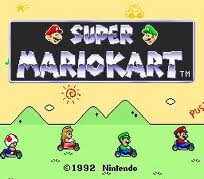
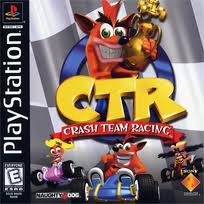
Super Mario Kart, Mario Kart Wii, and Crash Team Racing | SNES, Wii, and Playstation
Nintendo, Naughty Dog
1992, 2008, 1999 | Racing, Kart Battles | No pure racing games made my list because I really don't have an affinity for cars. Games like Gran Turismo seem to be based as much on the racing elements as on the vehiculophile stuff. Karting games don't have this problem. Instead, they offer a quirkier, but more involving mode of driving, where well-timed manuevers can gain you precious milliseconds in ways that conventional cars simply can't. Add in the absurd weaponry and other fanciful power-ups, and I think you get a good balance. I've included Crash Team Racing here because I feel that it is every bit as good as the Mario Kart games. In fact, it is more highly configurable and the time-trial mode is absolutely stellar, requiring even more skill than the Mario games. My one criticism of all of the Kart games (and perhaps all racing games), is the handicap system. This is when the game gives you slightly more speed when you're behind and gives the computer slightly more speed when you're ahead. The idea is to keep the levels engaging, but it can be very frustrating. In addition, with the Kart games, the weapon distribution is directly correlated to what position you are in. If you're in first, expect bananas, and if you're in last, the lightning bolt will make an appearance. Especially in Mario Kart Wii, where certain weapons are over-powered and commonly target the player in 1st place, this can get really annoying. |
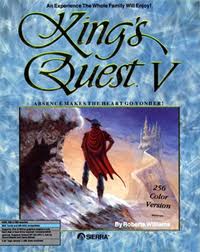
King's Quest Series [Through V] | PC
Sierra
1984-1990 | Adventure | The King's Quest games are some of the earliest graphical games I can remember playing. I remember finding the original King's Quest basically impossible, and spending months working on King's Quest V. It ended up being one of the hardest games that I successfully completed. King's Quest IV was especially irksome to me, and I remember obsessing over the damn 'golden bridle' that was supposedly hidden inside a shipwreck on a tiny island. Anyway, these games captured my young imagination and I can still understand their appeal. I think that games like this helped shape my ability to problem-solve and I lament that there aren't more games of this sort available today. |
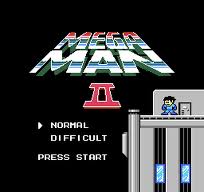
Mega Man II | Nintendo
Capcom
1989 | Mario-clone | Mega Man is a mega series with over 100 titles, if you can believe it. It's pretty ironic that the second one ever turns out to be the very best, although I have clearly not played them all. Mega Man II has the best set of boss robots, the best music, the most imaginative level design, and the best ending. It is also the last title in the series before everything became too formulaic (haha, two games is all it took). |

Frets on Fire | PC
Open-Source
2006 | Guitar Hero Clone | When Guitar Hero first came out, and was incredibly hyped up, I dismissed it easily. As a music snob, I've always felt that creativity shouldn't be parodied, and games such as Guitar Hero emphasized technical skill over songwriting ability and ultimately, artistry. I still feel that this last point is true, but after having actually played the game, I feel that its appeal is undeniable. Fortunately, some folks in Finland decided to create an open-source version of the game that allows you to use the guitar controllers and can import all of the songs from the Guitar Hero and Rock Band franchises. Not only this, but they also allow people to fret their own songs and submit them to the online forums. Now that I could actually play good music, the game took on a whole new level of enjoyment for me. In the end, I fretted about ten of my own songs, including Built to Spill and Yo La Tengo, and played the game pretty regularly for a Summer or more in Pasadena. |
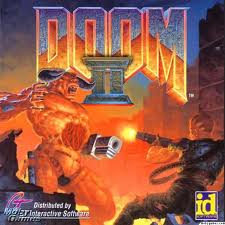
Doom II | PC
id
1994 | First-Person Shooter | The original Doom terrified me. I remember getting a demo of it on a 'demo-disc' that a magazine I subscribed to distributed one month. I installed the game, played the first level, and couldn't finish it. I was genuinely scared. I had never played anything so dark and sinister. Wolfenstein 3D was similar in gameplay, but bright and colorful and cartoonish. Doom was serious. By the time Doom 2 rolled around a year or so later, I was more capable of dealing with the fear, and so I bought the game and played it through. It was intense, and hard, and still pretty damn scary. I don't believe I ever finished it, the later levels were incredibly hard, but I got near enough to feel satisfied with my purchase. This may be one of the weaker games on this list, but nobody can deny that this series spawned one of the most successful video-game genres of all time, for better or worse. |
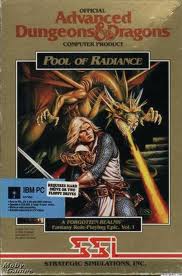
The Gold Box Games
featuring Pool of Radiance | PC
SSI
1988-1992 | Role-Playing | Pool of Radiance was one of the earliest role-playing games I can remember playing. The rules are based on Dungeons and Dragons and the game world was first-person when exploring and third-person (and highly tactical) for combat situations. The storyline was a bit difficult to follow since we didn't own a legitimate copy of the game, or the manual, which is referenced at several points throughout the game. Nonetheless, it occupied a lot of my time for a while as a kid and I've since revisited it on a couple of occassions. After Pool of Radiance, SSI released several more 'gold box' games that followed basically the same formula. Although I had not played then when younger, I did play some of them later and found them to be of approximately the same quality, hence their inclusion here. |
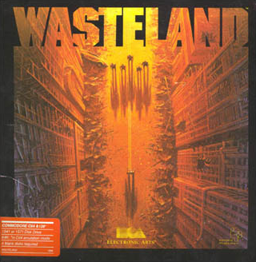
Wasteland | PC
Electronic Arts
1988 | Post-Apocalyptic
Role-Playing | Wasteland is one of the most unique and memorable games I've ever played. In format, it's basically like a cross between Bard's Tale and the Gold Box Games. In content, it could not be any more different! You navigate a party of post-apocalyptic survivor-rangers in third-person through a wasted world full of goons and miscreants. When attacked, the game switches to a different view which maintains the spacing between friend and foe, but gives you a closer and more detailed look at whatever organism you have encountered. These pictures, frequently of mutated animals, street thugs, and prostitutes, pandered greatly to my young mind. The coarseness of the world in which Wasteland is set, and the detail given to it by the designers are not commonly found in other games. In addition, its open-endedness and puzzle-solving content were very appealing to me. Finally, I've always felt that Wasteland is an extremely difficult game to beat without a walkthrough, and this prevented my young persona from making it more than 70% of the way through despite multiple attempts. My inability to complete the game made it seem like it went on forever, which just added to the intrigue. Even if you're not much of a retro-gamer, this one is worth a run through. |
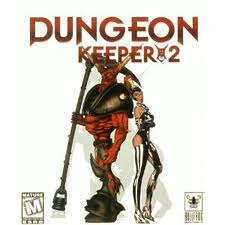
Dungeon Keeper 2 | PC
Bullfrog
1999 | Real-Time
Strategy | Dungeon Keeper 2 is, in many ways, the proper successor to Warcraft 2. Unlike Starcraft, which largely abandoned the whimsical nature of Warcraft, Dungeon Keeper took it to new levels. I've never played a game where you could take control of a feed chicken and experience the sensation of being eaten, or where one of your strongest units makes headway by farting clouds of noxious gasses. The smoothness of the gameplay, coupled with the incredible freedom given to the player and quality of the level-design made this game the best real-time strategy game on the market for several years. Unfortunately it never got the reception it deserved and the planned sequel was cancelled. I expect this may have been partly due to the lack of quality multi-player, which by this time had become very important to games of this genre. |
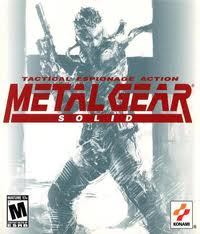
Metal Gear Solid | Playstation
Konami
1998 | Third-Person Tactical Shooter | Another game that came out towards the end of the golden era of gaming (the '90s), Metal Gear Solid appealed much more to my brother's tastes than my own. However, after watching him play it, I became intrigued myself and started a game. Immediately I was gripped by the unique gameplay, which involves infiltrating a compound undetected via various stealth skills. The developers had done an incredible job of introducing several new gameplay advancements without them becoming overbearing. At the time, the game seemed so far ahead of its peers that many publications lavished it with 'all time greatest game' accolades. As it turned out, many other games from similar genres would follow suit in the next few years, perhaps reducing the historical relevance of Metal Gear Solid slightly. Nonetheless, I still feel that it represents a major advancement for gaming and deserves its place on this list alongside other greats. |
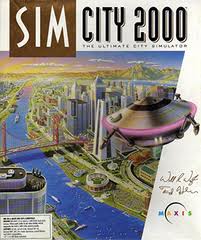
Simcity and Simcity 2000 | PC
Maxis
1989 and 1994 | City-Building Sim | I played the original SimCity at a very young age and enjoyed two separate challenges: First, building the most populated city imaginable with an infinite budget, and second, trying to create a good city around 'interesting' landscape with an infinite budget. At the time, the game was a bit too hard for me to derive much enjoyment out of playing without HEX editing my save game files for tons of cash. This cheating tradition, which I renounced for the vast majority of games, was strangely allowed when playing SimCity. SimCity 2000 was the natural progression for the game, and included many nuanced 'future' elements to keep it interesting, such as fusion power and arcologies. In addition, folks were able to make custom tilesets that transformed your city into themed ones and provided an entirely new look to the game. Perhaps the greatest thing about SimCity, besides terrorizing your own town with disasters post-save, was the newspaper articles. I always thought that the game did an incredible job of generating randomized articles about your city that were both hilarious and somewhat informative at the same time. Water Shortage Reported. |
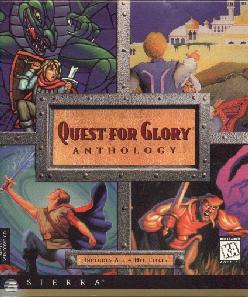
Quest for Glory I and IV | PC
Sierra
1989 and 1994 | Adventure
Role-Playing | It seems strange to me that Sierra released both King's Quest and Quest for Glory. Their similarities were so many that sometimes I couldn't keep them straight in my own head. The difference, ultimately, is that Quest for Glory allows for combat, whereas King's Quest does not. Nonetheless, the distinguishing character of both games is in the problem solving and the mystical, medieval landscapes in which they take place. I am not really sure why I put King's Quest higher on the list... perhaps because I played it more (and more of the games of the series) when I was younger. I didn't finish Quest for Glory until I revisited it in college, and that's when I played Quest for Glory IV. I feel that on a one-to-one basis, the Quest for Glory games may actually be superior, but for some reason the lingering effect is less. Anyway, they're both highly recommended! |
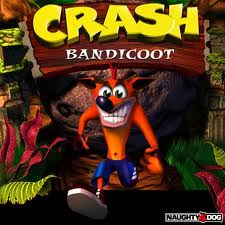
Crash Bandicoot I, II, III | Playstation
Naughty Dog
1996, 1997, 1998 | Mario-clone | When many people think of the second best Mario clone series, they think of Sonic the Hedgehog or Donkey Kong Country. I hate to be blunt, but they're wrong. Not to discredit these great series, it's just that not nearly as many people have played the Crash Bandicoot games, and thus they've been unfairly ignored. I feel this is unfortunate because the Crash games had the perfect mix of playability and whimsy that makes video games such a hallmark of modern childhood. They're also incredibly deep and although beating them is typically straightforward, unlocking all of the secrets takes mastery. It could have been easy for Crash to be another back-seat Mario wanna-be, but Naughty Dog did an incredible job and created a universe unto itself. With the release of Crash Team Racing, they proved that imitation is not just flattery, but an opportunity for advancement and expression. |
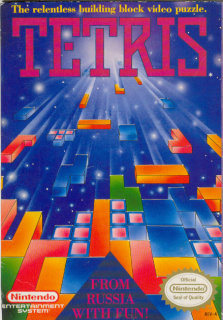
Tetris | All Platforms
Alexey Pajitnov
1984 | Puzzle | Tetris is the ultimate puzzle game. The name is recognized throughout the modern world, and it has spawned perhaps more clones than Mario even. It's also the thinnest and least overtly creative game on this list, a byproduct of being a straightforward puzzle game. But sometimes, simplicity is beautiful, and the austerity of Tetris gives it a timeless quality. I still consider it to be one of the greatest multi-player games of all-time, and some of the innovative multi-player rules additions in the various tetris games have added to the depth and complexity of play. So go enjoy a good game of... Tetris! |
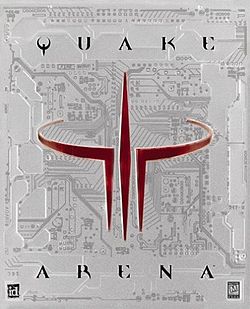
Quake III Arena | PC
id
1999 | First-Person Shooter | I've always been a skeptic of First-Person Shooters that came after Doom II. The Quake series never really captured my imagination, although I did play the demos of I and II that were released. One notable exception, that would change my opinion permanently, was Half-Life, but the quality of that title was more in story and environment than gameplay (although there were many advances there as well). Thus, I would say the only pure shoot 'em up that I've spent a great deal of time with since Doom II is Quake III. When I first played it, I couldn't believe that they had completely traded the traditional level-design single-player mode for an exclusively 'deathmatch' formula. I thought that I had the wrong demo or that I hadn't found the correct game option. Once I realized that this was how the game was designed, I accepted it and allowed myself to explore this creation. As it turns out, their decision was genius. You see, when all you are up against is mindless foil enemies in vast numbers, the game requires very little actual skill to beat. It's more a question of perseverence and luck. However, when pitted against a select few highly optimized AI opponents, it requires an entirely new level of skill and talent. This I realized almost immediately and was completely hooked. I spent weeks conquering every single-player deathmatch in Quake 3 on Nightmare. In order to beat the final encounter Xaero, I had to use some devious tactics, but even that was pretty ridiculously hard. I've even played some online multiplayer Quake 3 and found it to be very engaging and challenging, although the skill levels of the players I encountered varied widely. In the end I think that Quake 3 is a very pure and high-quality FPS that was the first successful title to bring multi-player into the AI domain. |
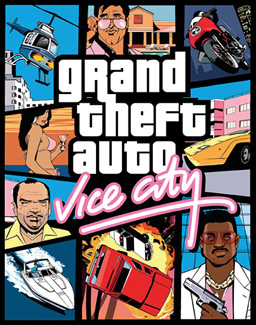
Grand Theft Auto
featuring Vice City | Playstation 2
Rockstar Games
2002 | Sandbox-style Action-Adventure | The Grand Theft Auto series appeals to people for a lot of different reasons. Most of these reasons are akin to Quentin Tarantino movies, and thus are complete turn-offs for me. I have no need to be pandered to with sex, drugs, violence and prostitution. Thus, when my brother bought a copy of GTA: Vice City, I was pretty sure that it would be in bad taste and low brow. After watching him play a bit, however, I was pleasantly surprised to find that the degree of seediness is largely controlled by the player, and that the game itself has a pervasive sense of street justice to it. It's also very well thought-out, whimsical (the radio personalities are hilarious), and challenging. In fact, I haven't found such a combination of qualities in many recent games, which seem to be becoming more and more specialized instead. Thus, I am forced to give credit where credit is due, and give kudos to Rockstar for a great game. I haven't played any of the other GTA games, but I've heard they are also spectacular (if a bit more gritty) so I'll assume they deserve attention as well. |
Section 3: Ten Curiosities I Played to Death
This section includes games that could hardly be considered among the greatest of all time, but that strangely appealed to me so much that I played them through and through. Thus, it's very possible that you'll enjoy a few from this list even more than some of those above, if you share the same interests that drew me to them.
| Title | Platform/Developer/Date | Genre | Notes |
|---|
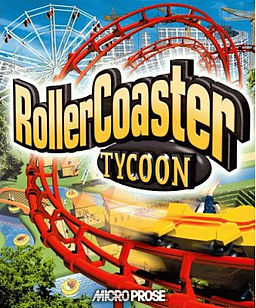
Rollercoaster Tycoon | PC
Chris Sawyer
1999 | Theme Park Sim | I played this game an absurd amount. In it, you design and build a theme park, featuring roller-coasters. What could possibly be the draw to that?! I don't know, but the game was so addictive that it was a bonding experience between my sister and I, who used to leave the laptop running overnight to earn income for our parks... I remember it was like a cross between SimCity 2000 and Theme Park, except more modernized and incredibly imaginative. I loved how the coasters you designed were analyzed from a physics perspective (G-forces, etc.) and assigned a rating that was impressively consistent. It certainly seemed like my skill for designing the coasters directly translated into success in the game. The same was true of the spacing and layout of the parks I created, which I spent hours on. In the end, when your park was finished, you felt like you had created a uniquely personal work of art. Perhaps what was most impressive was that despite the effort you put into creating this art, when the level was over, you were so excited about creating the next one, that it was never hard to leave the last level behind... Anyway, I've never played the sequels but I have no reason to believe that they've lost the qualities of the original, so any newcomers should probably get the third installment, which is the latest. Enjoy cleaning up the puke! |
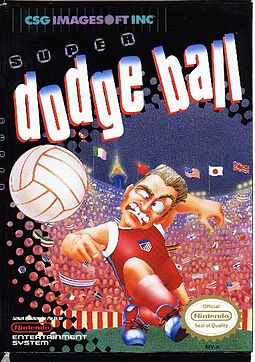
Super Dodge Ball | Nintendo
Technos Japan
1989 | Sports? | This game is a cult classic. An original cartridge sells on eBay for much more than most Nintendo games. Most people have never heard of it, and yet it is hands-down one of the best two-player games ever, and a damn fun single-player game as well. The game is simple: choose a nation and play as their team in a dodgeball match against another. The rules allow for some very creative maneuvers, and each player has two specials (Paul has three) that vastly increase the complexity and level of gameplay. My neighbor down the street owned a copy when I was a kid, and we used to play epic matches of USSR vs USSR that would last up to an hour. After that, I never could find another person who could muster nearly enough skill at the game to bring it to that level, and this always bothered me, to know the potential of a game but never be able to experience it. Instead I played the single-player game with the weaker nations to challenge myself, and this was a poor but adequate substitute. One other thing to note is that the music in the game is incredible. A different song plays for each nation's home court, and sets a very good mood for the match. I'm always impressed at how much music can influence the quality of a movie or video game. This is just another example of that. |
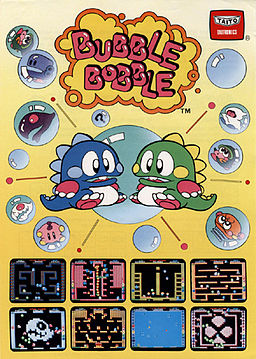
Bubble Bobble | Nintendo
Taito
1986 | Arcade | This game carries an exceptional personal significance for me. It was one of my earliest gaming obsessions (like Final Fantasy, but earlier), and spawned the first set of fictional stories I ever wrote when I was 6. I still have the stories and, repleat with misspellings, they are really entertaining to read from time to time. The game itself is very simple, and involves defeating all of the enemies on each of a near-endless series of numbered levels. The player is either Bub or Bob, miniature dinosaur-looking dudes that shoot bubbles and collect food, crystals, and powerups. The idea is to trap each of the opponents in a bubble and then pop it before they escape and get 'angry'. Some of the levels are fiendishly hard and I doubt that I've ever beaten the game straight through. I've gone back and played the game pretty recently and still find it to be an enjoyable arcade experience. It retains its difficulty, and I am surprised at how far I must have been able to get when I was only 6 or 7. Remember, a well-timed jump allows you to bounce on your own bubbles ;-) |
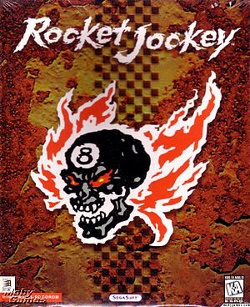
Rocket Jockey | PC
Rocket Science Games
1996 | Sports? | This game rocks! Easily one of the most improbable titles on this page, Rocket Jockey defies convention. It's one of those rare ideas that should have gone wrong, but instead went fantastically right, producing a game that may be even better than the praise I am heaping on it. Unfortunately, the game is super hard to describe, being that there are no parallels to any real-life phenomena. Here's my attempt: The game is centered around a futuristic set of rocket sporting-events, including races, battles, and even a ball-game. The players ride on high-powered rockets which have a set of speeds between fast and uber-fast, and basically cannot turn. Instead, they are equipped with grappling hooks that, when attached to a pilon or other feature of a course, allow the craft to pivot around the object and thereby change direction. In addition to using them on pilons for turning, the grappling hooks may also be employed for myriad other purposes as well. For example, if you fire your left hook and snatch a pilon, and fire your right hook and snatch another pilon, you can then connect the strings to create a trip-wire that might knock other players (or you yourself) off your craft. Alternatively, you could snag a human pilot out of his craft with your left hook and, using your right hook, attach him to a pilon after dragging him a good distance. In battle mode, this would do some good damage to them and result in a significant point increase, but not as much as if you had tied him to another human player, or better yet, an exploding mine. As you can see, the game allows for some interesting physics and sinister manuevers. If this sounds interesting to you (how could it not), you should definitely give the game a try. |
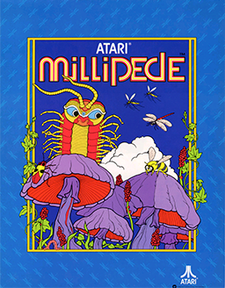
Millipede | Atari 2600
Atari
1982 | Arcade | As long as I can remember, my family had a video game system. The very first was the Atari 2600, which my father had purchased in 1985 or so, after its popularity had waned and the price had come down. Most of the titles that we owned came from bargain bins or massive sales, since the per-cartridge price for a new game was completely exhorbitant. By the time the Nintendo came out and the Atari took the back seat, we owned somewhere near 30 Atari games. Of these, there were several standouts but, when I broke out the old system in college and revisited our collection, only two managed to have any staying power: The first was Tapper, a game where you serve beer to aliens (what?!?) and this one, Millipede, a classic game that has somehow aged incredibly well and continues to provide a thrilling, intense arcade experience. It's very straightforward. On each level, there is a millipede creature that slowly makes its way down toward the bottom of the screen. Your job is to kill all of the pieces of it before something kills you. at first, there's very little in the way of threats, mainly just the millipede marching toward you. In later levels, however, the game throws the book at you, with spiders, roaches, beetles, flying crosses, and tons of other random shapes attacking you constantly. In the end, it creates an incredibly intense gaming experience considering the laughable level of technology in the game. |
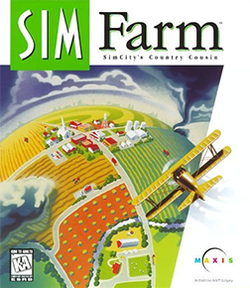
SimFarm | PC
Maxis
1993 | Virtual Farming | This is SimCity's long-lost bastard stepchild. I'm not sure how we obtained a copy of it, probably in a bargain bin at some point... But what a find! You would never expect it, but this game is pretty damn fun, and balanced enough to be enjoyable without any SimCity-esque cheats or hex-edits. You basically manage a farm with up to 30 types of produce and 4 types of livestock (sheep, pigs, cows, horses) and must perform all of the duties that this entails, such as plowing, seeding, planting, irrigation, pest-control, disease-control, fungus-control, distaster prevention/recovery, harvesting, marketing and sales. You also have to maintain a collection of farming equipment (you can even get a crop-duster and pilot it yourself) and other buildings, such as sheds, silos, and barns. Eventually you'll become prominent enough to influence the growth of the nearby town, and even have a hand in the local elections. After a few scenarios the game does lose its replayability, but it's a worthy title and shouldn't be forgotten. |

NBA Jam | SNES
Midway
1993 | Sports | This is, perhaps, the only somewhat-legitimate sports game on this page. However, the rules of basketball are clearly stretched in this game, where most of the players can jump about 30 feet in the air and do a dozen somersaults. While I played this game a decent amount back in the days of the Super Nintendo, it wasn't until I lived in Madison and revisited it on an emulator that I found its true value. My roommate Martin, and a few of our other friends would play 4-player games that were at an incredibly high level. The games were always nail-biters and we appreciated how the handicap system of this game kept things reasonably close most of the time. In a world where games have historically been a very escapist, solo experience, its good to see that there are some stellar multi-player games out there, and NBA Jam is certainly one of the best. I haven't played any of the modern remakes, but if they're anywhere near as good as the original, they're probably worth looking into. |
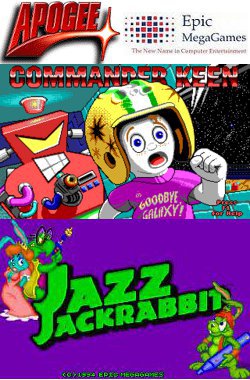
Apogee and Epic Megagames
featuring Commander Keen and Jazz Jackrabbit | PC
Apogee and Epic Megagames
1990-1994 | Mostly Mario-clones | In the early nineties, during the golden age of gaming, tons of small software companies were springing up and wantonly hawking their wares throughout the computing universe. The prevaling method for this was to offer the first episode of a game series as shareware and include advertisements for the later, paid installments along with them. My father obtained countless such titles from something called 'PC-SIG' at his workplace, and my brother and I would immediately gobble them up. Many of the best games were made by Apogee and Epic MegaGames, and because they released so many, we never once paid for the remaining games of a given series. Nonetheless, we played the shareware versions of a few games ad nauseum, and two of these, Commander Keen and Jazz Jackrabbit, are the most memorable. They also happen to fall on opposite ends of this era, Commander Keen being released around 1990 and Jazz Jackrabbit, featuring incredible 8-bit music, being released in 1994. Both games are Mario clones featuring Bart Simpson-minded protagonists under assault from myriad aliens or sinister beings of all kinds. The gameplay of Commander Keen was more straightforward mario-esque, but Jazz Jackrabbit had more of a frantic, Sonic-inspired pace. In fact, much like Sonic, Jazz included bonus levels with a 3D POV-aspect where you would race at high speed around a level attempting to collect all of the jewels. I can't really recommend for someone to actually go back and play these games, since they're really period pieces, but I feel they certainly deserve inclusion in this list due to the sheer number of ours my brother and I spent playing them back in the day. |

Chessmaster: Grandmaster Edition | PC
Ubisoft
2007 | Chess | When I was young, I wasn't very good at chess. I was good enough to beat all of my classmates, but I never once could beat my dad. This wasn't really a surprise, since he was a Class B player at the local chess club, but it was still a bit depressing for me. Except for the occassional game with dad, I basically gave up on chess until I was 27. In the summer of 2010 when I was working heavily on CyPace, my roommate Ivan bought a chessboard and invited me to rediscover the game with him. It turned out to be a lot of fun, and we played probably over 100 games during the course of that summer. The best part was that not only were we pretty evenly matched, but we were also learning at about the same speed, which kept things interesting. At one point I downloaded this game after reading numerous reviews praising its teaching courses. Once I got it I started the first course and was very impressed. Joshua Waitzkin, the child prodigy immortalized in the movie 'Searching for Bobby Fischer,' does the voiceover for a series of lessons that drastically improved the quality of play for both Ivan and I. After completing the courses we spent some time playing the computer but quickly found that this paled to our real-life matches. That isn't to say that the game has any defects, however, just that we didn't have the patience to wait for a computer to simulate thinking, and if the computer was set to move right away, we would follow in step, and make too many mistakes. I figured it was better to keep it recreational, and so gave up the computer play. |
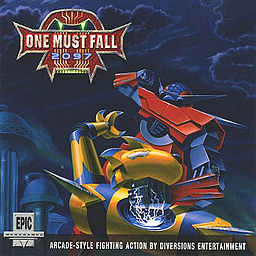
One Must Fall: 2097 | PC
Rob Elam / Epic MegaGames
1994 | Combat RPG | Earlier on this page I said that my brother and I never paid for any full-version releases from Apogee or Epic MegaGames. I must now admit that this wasn't true. However, I had forgotten that One Must Fall was released by Epic until just now. This game is of the same genre as games like Street Fighter and Mortal Kombat, but it had some interesting distinctions. Firstly, it didn't feature humans, or even animals, but rather 'mechs' or human-controlled machines. Second, instead of you retaining the same fighting character through the game, you could buy and sell these mechs and upgrade them, thereby changing your capacity and chance of winning a given match. Third, the player maintained a set of characteristics, much like in a Role-Playing game, that also had an influence on your strength, speed, etc. These qualities could be improved over time, and made you feel like you were investing in the game as you played it, much like a role-playing game. Finally, instead of being confined to a single over-arching tournament like most games of this genre, you could enter into several different tournaments for various entrance fees and prizes, and this introduced a quality of economics that was unique. In the end I feel that this is another game that's probably not worth revisiting, but that was certainly underappreciated for its time. |
Section 4: Additional Lists
Games I Plan to Play
Baldur's Gate EasyTutu **Currently Playing**
Starcraft II [Single Player]
Chrono Trigger
The Legend of Zelda: Ocarina of Time and Twilight Princess
Diablo III [Single Player]
King's Quest VI
Elder Scrolls V: Skyrim
Overrated Games
Halo [Terrible Compared to Counterstrike]
Back to Index








































